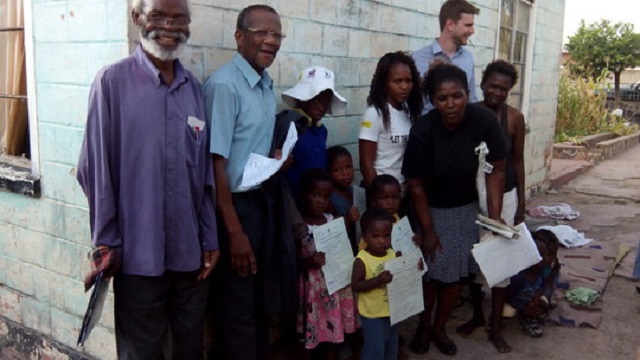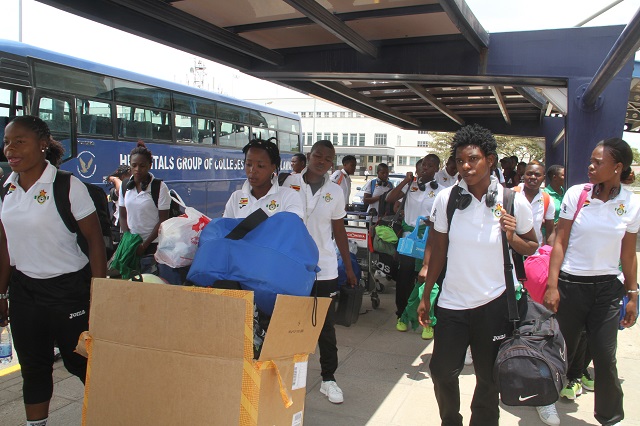Concern over children without birth certificates: Ignorance, cultural beliefs cited

Crystabel Chikayi, Features Reporter
EXPERTS say poverty is the commonest reason why some children across the country do not have birth certificates, years after they are born.
Ignorance about children’s rights and cultural beliefs are also cited as other reasons why some of them grow up with no birth certificates.
It has also been said that some children do not have birth certificates because their parents do not have identification documents themselves.
Birth registration is a right yet recent statistics show that about 2,4 million children under the age of 17 years, translating to 39 percent of minors in the country, do not have birth certificates.
Growing up as a young girl in Jotsholo, Matabeleland North province, Ms Sgconiwe Nyoni had no idea what a birth certificate was.
She was delivered at home into the hands of home midwives — something which had become a family tradition.
Her parents did not think of going to the nearest registry office to register her birth.
Furthermore, she never went to school as her parents — a housewife and a herdsman – could not afford her fees so a birth certificate was never required.
It was not until she got married and had children of her own that she learnt of the need for a birth certificate.
“I’ve two children and they both still don’t have birth certificates because I don’t have the requirements needed for me to get identity documents before I can register them. I never knew what a birth certificate was or why it was needed,” said Ms Nyoni.
“My husband was invited to Bulawayo by his brother who had got him a job. We moved to Bulawayo as a family and I realised all the children in the neighbourhood we lived in went to school.”
Ms Nyoni said when she tried to also send her children to school, they could not be allowed in as they had no birth certificates.
“I negotiated for my kids to be allowed into class but was told they needed birth certificates in order for them to be registered into the school.”
She went to a registration centre in Pumula suburb where she was to receive the shock of her life.
“There was nothing as disturbing as discovering that my children couldn’t be registered because their father and I had no identity documents. I was told that I’d first have to pay a certain amount to get a birth certificate and an identification card.”
Once that was done, Ms Nyoni was told to bring birth records for her children in order for them to get birth certificates, but she did not have the slightest idea what those were as her children were born at home.
Her quest to obtain identity documents for her children hit a snag and she has not made any progress with her pursuit since then.
A birth record is given to a new mother after she delivers at a hospital or clinic and is required for one to get a birth certificate for their child.
In the case of a home birth, mothers are encouraged to head to the nearest hospital or clinic soon after delivery to seek medical attention. A birth record will be issued thereafter.
“People love to call those with no identification documents as amabhalabhala which is Ndebele for kudu, a wild animal. They equate us to wild animals that can’t be accounted for by the government. To them, we don’t even exist because we’re not registered anywhere,” said Ms Nyoni.
The right to a name and an identity is one of the most fundamental human rights, and is especially critical to the realisation of children’s rights.
Children without birth certificates are at a higher risk of lifelong deprivations and exclusion from socio-economic benefits.
Experts say unregistered minors often have no access to education or health care, and are easy prey for human traffickers.
Mrs Patience Ndlovu, a mother who was queueing to get her child a birth certificate at the Bulawayo Births and Deaths Registry Office recently said she had spent most of the day at the office as the process is slow.
“The queue is hardly moving. I’ve been here a couple of times before and have often given up because the service is so slow,” said Mrs Ndlovu.
Scores like Mrs Ndlovu have continued to procrastinate, saying the process is slow yet birth registration is an essential first step in a lifetime cycle of civil registration.
It is a fundamental human right enshrined in Articles 7 and 8 of the 1989 United Nations Convention on the Rights of the Child, which gives every child the right to be registered at birth by the State within whose jurisdiction she/he is born.
Birth registration also serves as a prerequisite to the realisation of other human rights integral to a child’s development and well-being.
It is a crucial first step towards building a protective environment against abuse, exploitation, violence and statelessness.
Bulawayo provincial registrar Mrs Jane Peters said registration processes are governed by the Births and Deaths Registration Act.
She said the Ministry of Home Affairs has a number of sub-offices which issue birth certificates and identification cards across the country.
“We have sub-offices which were installed to help people access birth certificates easily. In rural areas, the sub-offices are located at major hospitals such that when one gives birth, they can register their baby before they leave the hospital,” said Mrs Peters.
In Bulawayo, she said, sub-offices are located in Emakhandeni, Pumula and Nketa suburbs as well as United Bulawayo Hospitals, Mpilo Central Hospital and Tredgold Building.
Mrs Peters said as government endeavours to make it easy for citizens to obtain birth certificates, getting a birth certificate for children aged between zero and six is free.
She said when one is getting a birth certificate for the first time but is above the age of six, they are required to pay $2.
“An individual is charged more than $2 only when that person is getting a duplicate of a birth certificate or an identification card after losing the first one,” said Mrs Peters.
The requirements to get a birth certificate differ depending on the situation of the person collecting it, she said.
“Some will be orphans, some with an unknown father and some will be having unmarried parents —for all these situations there are different requirements. There’s no reason why one can’t get a birth certificate – there’s no situation we can’t solve.
“When people come without the required documents, we don’t turn them away. We interview them and find out what they have and don’t have then tell them what they need to bring. The problem is after that happens, people go home and whine. They don’t come back with what we tell them to bring,” said Mrs Peters.
@cchikayi








Comments